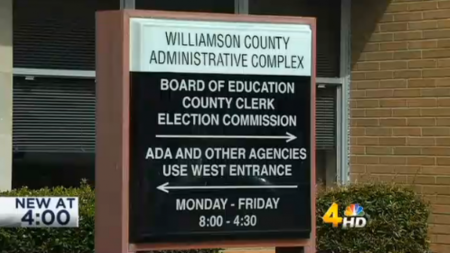Tennessee School Board's Push for Prayer May Be Met With Lawsuits

The Williamson County School Board in Tennessee is debating whether it will replace a moment of silence at its regular meetings with a prayer, despite warnings that such invocations might be unconstitutional.
During its Monday meeting, the board's policy committee discussed replacing its moment of silence with a prayer that would follow the call to order and the Pledge of Allegiance.
Bill Squire, the school board's attorney, told members that a ruling from the U.S. Court of Appeals for the Sixth Circuit prohibits the school board from holding a prayer.
Kenneth Petersons, a board member and supporter of the prayer, challenged Squire by asking him how a short prayer could unduly influence children.
"How is having a prayer during our board meeting affecting any one of our 35,000 students? For me, ultimately the business of what we're trying to do outweighs the first minute and-a-half of a board meeting. ... To me, it's not something that ultimately affects the students," Petersons asserted.
Fellow board member Candace Emerson testified, "A prayer has saved my life more than once. I'm just telling you, there's an incredible power, especially when it's collective. I know I wouldn't be sitting in this chair today — on two occasions recently."
The discussion ended, however, when Williamson County Schools Superintendent Mike Looney brought up the possibility of a lawsuit.
"Are you willing to stand up on a matter of principle and spend hundreds of thousands of dollars in attorneys' fees to make a point based on your personal belief that may or may not align with those of other people in the community," he asked the board members.
The American Civil Liberties Union cites the 1999 case Coles ex rel. Coles v. Cleveland Bd. of Educ. in an effort to urge school boards not to hold prayer before meetings.
In a leaflet entitled "Know Your Rights: Religion in Public Schools: A Guide for Administrators and Teachers," the ACLU asserts that, "The 6th Circuit Court of Appeals held that the board's practice of opening its meetings with a prayer violated the Establishment Clause, finding 'the school board's practice of opening its meetings with prayer leads to excessive entanglement in religious matters …'
Legal ministry Alliance Defending Freedom counters claims that prayer during public meetings violates the Establishment Clause. According to ADF, such assertions "intentionally mis-frames the analysis."
Instead, the ADF holds that "legislative prayers serve the legitimate secular purposes of solemnizing public occasions, expressing confidence in the future, and encouraging the recognition of what is worthy of appreciation in society, and have never been understood as conveying government approval of particular religious beliefs."
This policy change has not been finalized, according to WIS-TV. Members must discuss the issue three more times before the issue is voted on, with the first meeting scheduled for Oct. 16.
wistv.com - Columbia, South Carolina |




















